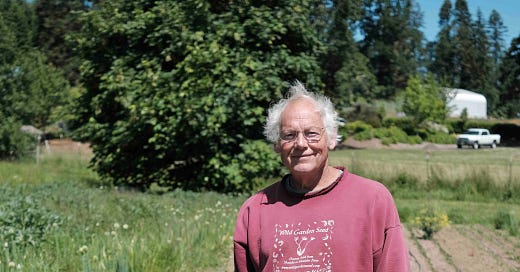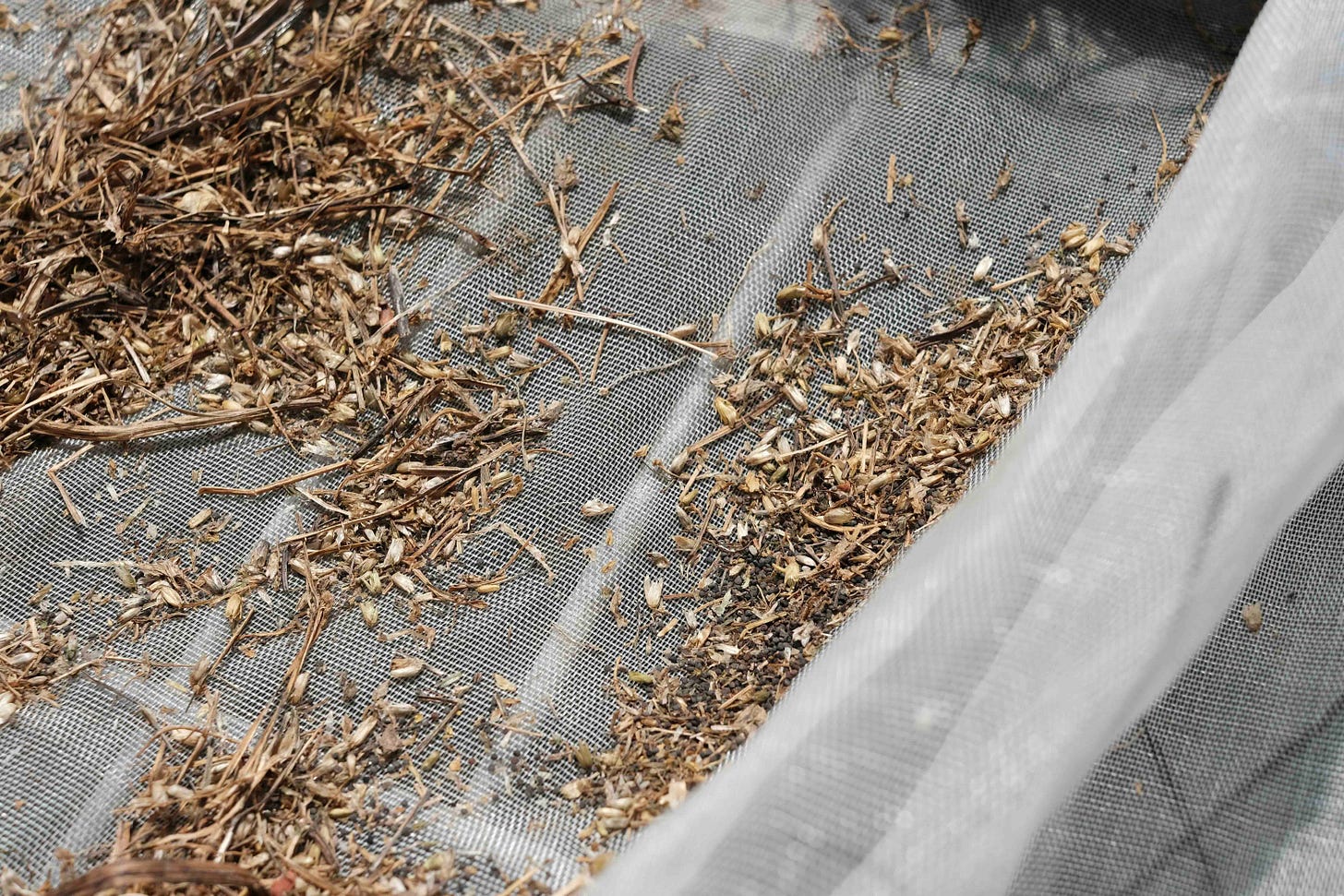On a gloriously sunny morning on 30th May, I made the drive out to Philomath to visit Frank Morton of Wild Garden Seed.
An organic farmer, plant breeder and seedsman, Frank is famous in the seed community for creating hundreds of lettuce varieties, along with other crops such as peppers, kale, beets and more recently moving into flower seed production. Frank and Karen Morton founded Wild Garden Seed in 1994, after Frank noticed a distinct lack of diversity in the salad leaves they had been growing commercially for market since the 1980’s. He began dabbling in plant breeding, and soon became hooked. Frank defines his style of work as ‘experimental breeding’, selecting in the field, often disappearing down a rabbit hole to create new varieties from the incredible diversity presented through cross pollination. Wild Garden Seed’s ‘ecological approach to plant breeding and crop protection generates superior varieties for farmers who don’t use chemical crop protectants and fertilisers. The small-scale care and authentic fertility of their farm fields yield fat seed with exceptional seedling vigour, a key trait for organic crop success. This seed is organically bred to be organically grown.’
I have followed Frank’s work for a long time, so I was extremely excited to spend the morning with him, walking his fields and discussing all the breeding projects he is currently working on.
One of the key traits Frank has worked on from the beginning is the red pigment in lettuce leaves. It was fascinating to hear him discuss how this work has evolved over the years. His original varieties that, compared to anything else on the market at the time, seemed so vibrant in colour now pale in comparison to more recent developments such as Hyper Red Rumpled Wave. His current mission is to achieve a deep pink blush in the centre of the lettuce, looking for the persistence of a non-UV dependent gene that would allow for this trait to occur. In our fast-paced world of instant gratification, it felt refreshing to listen to the clear sense of accomplishment and satisfaction that Frank gains through the patience and dedication required to do this kind of work.
Frank has travelled to the UK several times, and we discussed the difference in seed laws between the two places we call home. One of the motivations for my trip to the US was to visit a place where heterogeneity is allowed within varieties. In the UK, seeds are currently required to go through a strict DUS testing prior to being added to the official ‘national varieties list’ so they can be marketed. Crops are required to be Distinct Uniform and Stable, allowing for little phenotypic or genotypic variation within a variety. This is obviously of benefit for farmers who need uniformity and consistency in their crops, but it is aimed at large scale agriculture where only significant volumes of seed are likely to be traded. It does not allow for the dynamic management and evolution of varieties on a farm, particularly important to organic and small-scale growers who need more adaptability. It would certainly restrict Frank’s ability to carry out this kind of breeding work if laws were the same here.
‘My favourite thing to do is mix things up! I love the F2 generation. I create diversity, select to some extent, then I put it in my catalogue while there is still some variation in the population. One reason to that is these seeds are going to go off to other places, to Colorado, to the East Coast, to California, all those places are different from here. So by sending seeds that still have variability in them, I’m essentially giving people in those other locations the opportunity to make a selection that will be right for their location.’
I discussed with Frank how homogeneity in our UK crops could be limiting the potential to get inspired – we don’t often get to experience the joy of seeing the diversity of plants that occur when we allow genetics to roam a little. This could be having unintended consequences – impacting how many farmers take that moment of enlightenment to the next level, save seed from that unusual plant, or get inspired to read a little more into the plant breeding process.
‘Plant breeding is so natural and intuitive because the simple act of making a selection is in itself an evolutionary force. We need to have variation, and we probably need to generate more variation as there are more variable climates coming. And you do that by mixing things up.’
As well as discussing his extensive plant breeding, Frank and I also chatted about his changing approach to soil management over the years, and his increasing awareness of the impact of soil health on plant, and therefore seed, health. Frank acknowledged the tendency of many farmers to stick to what they know, that management ‘habits’ are hard to break, and that there is a real need for us to step out of the day to day and really ask ‘why’ we are taking that action. He has been moving towards lower input methods on his own farm, reducing tillage and exploring different ways of managing the soil.
‘How much of our farming is pure habit? Tillage is the first thing that comes to mind. Look at that tree, it doesn’t have any tillage in its management, but there it is healthy and growing. So, the question is often, why are we doing this? Things may grow faster in the beginning, but then we find ourselves having to intervene. Are we stimulating plants to grow too fast?’
Frank is open to trying new methods, he’s even considering Dry Farming an area on the site, increasing the diversity of management practices which will in turn increase resilience. It seems like diversity in all elements of farming brings exponential benefits.
‘Diversity gives you choices. Diversity can take advantage of certain opportunities and challenges that uniformity can’t. Without diversity, you don’t really have any choices about how your crop is responding to the environment. If you have diversity, you can select towards plants that are better adapted to the situation. It’s all about adaptation, and adaptation only occurs when there is variation. Without variation, evolution doesn’t happen.’
Frank and the Wild Garden Seed team seem to have always been innovative within the seed community. Frank is a founding member of the Open Source Seed Initiative (OSSI), a non-profit focused on establishing a diversified and decentralised seed system. Wild Garden Seed pledge many of their varieties to OSSI, preserving the rights of farmers, gardeners and breeders to freely use, save, replant and improve on that material. These seeds are fully in the public domain. The initiative is a direct response to the growing number of patents and restrictions that are emerging in the commercial seed world, and really demonstrates the power of farmer led networks.
Along with OSSI, and the exciting new varieties that appear in the catalogue every season, there’s also the game changing equipment that has rocked the seed world: Mark Luterra developed the now infamous Winnow Wizard whilst working with Frank at Wild Garden Seed.
Seeing the need for a piece of kit that would infinitely speed up and improve the seed cleaning process for small-mid scale farmers, Mark set his incredible engineering mind to creating a piece of technology that can now be found in most small seed companies across the US and beyond. And in line with much of what emerges from Wild Garden Seed, Mark offers the plans open source on his website, although with the caution that it is very much an advanced level DIY project! Mark used to make each machine by hand, but they can now be purchased via Oppen Works. I had the pleasure of meeting Mark whilst at Adaptive Seeds and got a demo of their two Winnow Wizards in action. I also got to formally meet Winnow Wizard no.1 on my tour of Wild Garden Seed, an inanimate object that feels like the equivalent of royalty in the seed world!
During our time together Frank regularly hinted at the growing urge to slow down, that he might be approaching some kind of retirement, but his enthusiasm and passion for his work suggested otherwise…There seems to be a heavy weight of responsibility that rests on the shoulders of the organic plant breeders in this network. How do you stop this work, when the world around us spills over with conflict, social unrest, climate breakdown and biodiversity collapse, and pleads for you to continue the fight?
‘To deal with a new climate, in the last few centuries, we took plants from their old climates and we brought them to new climates, so that was climate change from the perspective of the plants. Now new climates are coming to us, even as we’re sitting here, so it’s more important that we maintain, and even generate more diversity in our crops. The kind of change that is coming, the only way to adapt to it is to have variation in the crops, and for us to be selecting for what grows best. It’s very simple.’
Every year, Wild Garden Seed releases a beautiful seed catalogue and sends it out to their vast network of customers. For some time, Frank has written an essay at the start of each catalogue. These essays are often contemplative - his most recent reflecting on the demise of a statuesque tree in his garden after it was hit heavily by the dramatic ice storm event that occurred in Oregon last winter. The tree that had stood for so long, host to so much life, had unbeknownst to Frank, been slowly been rotting from the inside. Full of mycelium that had clearly taken hold decades before, on the outside the tree seemed to be healthy, functioning, but scratch the surface and it was a different story.
This story feels particularly pertinent and of the moment. If we stick to the current structures and framework, if we just keep seeking solutions, are we subjecting ourselves to rot and decay? What we need, it seems, is a paradigm shift. One that embraces connection, community and diversity - something that all the incredible folks I have met so far on this journey are, in their own way, working to achieve.









